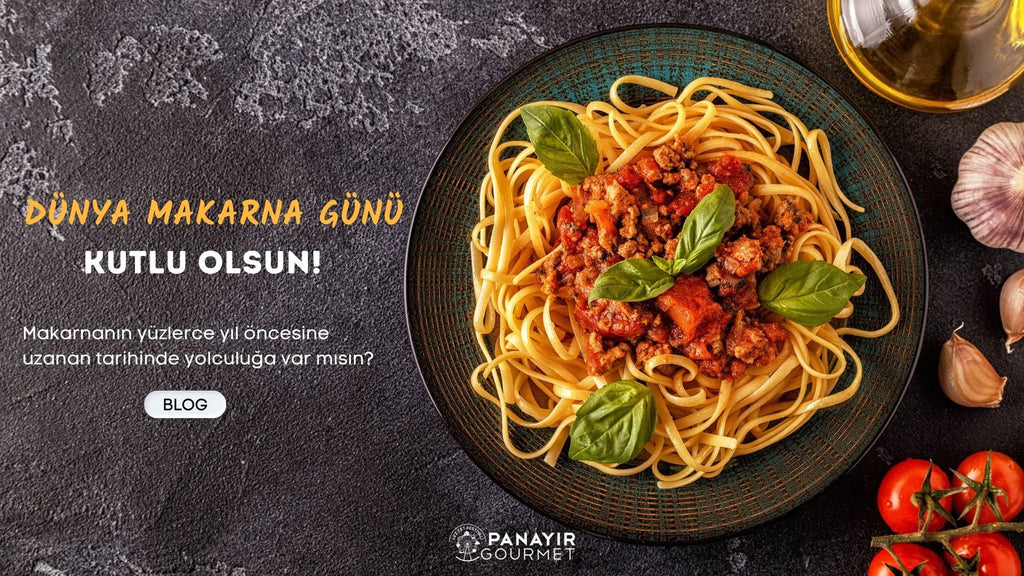Happy World Pasta Day!

Are you ready to take a journey through the history of pasta dating back hundreds of years?
Did you know that there are 600 types of pasta that everyone from 7 to 70 enjoys, that on average 2 kilos of pasta are consumed per person per month in Italy, and that Turkey is second in Europe and fourth in the world in pasta exports? Today, on World Pasta Day, we decided to tell you what we know about pasta, which is nutritious and delights the palate with its taste.
It emerged with the suggestion of the Turks
The idea of celebrating World Pasta Day was first proposed by the Turkish Pasta Industrialists who attended the event at the meeting held by the International Pasta Organization in Rome in 1995. In 1997, at the meeting held in the United States, it was decided to declare 25 October as World Pasta Day and to celebrate it with various events every year. It was first celebrated in Naples, Italy, the country that comes to everyone's mind when pasta is mentioned today.
The history of pasta dates back hundreds of years
Although it is identified with Italy today, the origin of pasta extends from China to the Arabian Peninsula. Despite dozens of studies, information about who was the first society to make pasta and how it emerged is not yet clear. There is not enough information about the emergence of pasta in the National Museum of Pasta in Rome.
Although various studies have been carried out to find out who was the first society to discover and make pasta from past periods to the present, the society that made pasta "THE FIRST" has not yet been found. The documents found in the Pasta Museum in Rome today do not contain enough information about where pasta comes from. It is recorded that in 1292, when Marco Polo returned to Italy after visiting China, he brought with him information about spaghetti and how it was made. Looking at archaeological excavations and historical finds, writings and sources, pasta was made and consumed by Ancient Greeks, Romans, Chinese and Arabs.
Looking at historical records, it is known that the Chinese started producing barley noodles and pasta in the years before Christ. B.C. When we look at the historical writings found in Syria from the 5th century, it is seen that the Arabs produced and consumed barley noodles at that time. It is seen that the Arabs wrapped the dough they prepared on sticks, dried it in the sun and stored it. Likewise, it is known that dried dough, thought to be noodles and pasta, was traded in the Arabian Peninsula in the 10th century.
The first factory in Turkey was established in 1922
Pasta began to be loved and consumed more over time because it was low-cost and easy to produce and could be prepared and flavored in different ways. Pasta dough began to be kneaded by machines starting from the 17th century. King of Naples II. It is also recorded in historical records that Ferdinando ordered an engineer named Cesare Spadaccini to do this job and that this engineer invented the first pasta machine. In the 20th century, Italians increased production and quality with machinery and managed to export 70 thousand tons of pasta to the world in 1913. The fully automatic pasta machine was invented in 1933 by two Parma engineers named Mario and Giuseppe Braibanti. According to data, 3 out of every 4 pasta consumed in Europe comes from Italy. One in four pasta dishes on the table worldwide originates from Italy. The first pasta factory in Turkey was established in Izmir in 1922 under the name Turkish Pasta Factory. The factory founded by Hasan Tahsin Bey had a production capacity of 850 kilograms of pasta per day. Today, Turkey is the second largest pasta exporter in Europe and the fourth largest in the world.
Nutritious and healthy
Pasta, which is obtained by mixing semolina obtained from Durum wheat with water and some enriching substances, shaping it into the desired shapes and drying it, is a very rich food source in terms of vitamins and minerals necessary for the body. Pasta contains vitamins A, B1, B2 and calcium, iron, phosphorus, potassium and protein. It is also a satisfying food with the nutritional values it contains. Since it contains high amounts of linoleic fatty acid, it also has a cholesterol-lowering effect. The complex carbohydrates found in pasta mix slowly into the blood, keeping you full and giving you energy at the same time.
Special campaign for World Pasta Day at the Fair
World Pasta Day will be experienced in a different way at Fair Gourmet. Our chefs produce our pasta freshly and handmade daily from first quality Durum wheat. Classical spaghetti , casarecce , pappardelle , campanelle , tagliatelle, fusilli and many more... We are giving away special sauces that we have prepared from the types of pasta we prepare daily with an Italian recipe. Our freshly prepared sauces are Tomato Sauce, Bolanez Sauce, Pesto (Basil Sauce) and Cheese Sauce. Come to Fair Gourmet and let's celebrate World Pasta Day together.




